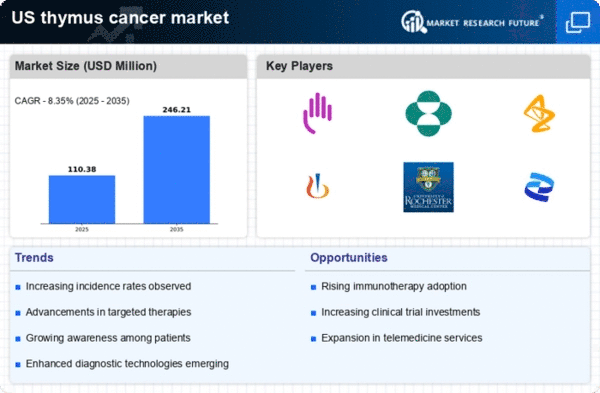Rising Incidence of Thymus Cancer
The thymus cancer market is experiencing growth due to the rising incidence of thymic tumors in the United States. Recent data indicates that thymic tumors account for approximately 0.2% of all cancers, with an estimated 400 new cases diagnosed annually. This increasing prevalence is likely to drive demand for innovative treatment options and diagnostic tools. As healthcare providers become more aware of thymic malignancies, the need for specialized therapies and targeted treatments is expected to rise. Consequently, pharmaceutical companies are investing in research and development to address this niche market, potentially leading to a broader range of therapeutic options for patients. The growing patient population may also stimulate collaborations between healthcare institutions and research organizations, further enhancing the thymus cancer market.
Advancements in Treatment Modalities
The thymus cancer market is significantly influenced by advancements in treatment modalities. Recent innovations in surgical techniques, radiation therapy, and chemotherapy have improved patient outcomes and survival rates. For instance, minimally invasive surgical approaches have become more prevalent, allowing for reduced recovery times and improved quality of life for patients. Additionally, the introduction of novel immunotherapies and targeted therapies is reshaping the treatment landscape. These advancements not only enhance the efficacy of existing treatments but also expand the therapeutic options available to oncologists. As a result, the thymus cancer market is likely to witness increased investment in research and development, as well as a surge in clinical trials aimed at evaluating new treatment combinations and regimens.
Growing Investment in Cancer Research
The thymus cancer market is benefiting from the growing investment in cancer research within the United States. Federal funding for cancer research has seen a steady increase, with the National Cancer Institute allocating substantial resources to investigate rare cancers, including thymic tumors. This financial support is crucial for fostering innovation and developing new therapies tailored to the unique characteristics of thymus cancer. Furthermore, private sector investments are also on the rise, as pharmaceutical companies recognize the potential for profitable returns in this underserved market. The influx of funding is likely to accelerate the pace of research, leading to breakthroughs in treatment options and diagnostic techniques, thereby enhancing the thymus cancer market.
Increased Focus on Personalized Medicine
The thymus cancer market is increasingly shaped by the focus on personalized medicine. As the understanding of cancer biology advances, there is a growing recognition of the need for tailored treatment approaches that consider individual patient characteristics. This trend is particularly relevant in the context of thymic tumors, which exhibit diverse genetic profiles. The development of biomarker-driven therapies is expected to enhance treatment efficacy and minimize adverse effects. Consequently, pharmaceutical companies are investing in companion diagnostics to identify patients who are most likely to benefit from specific therapies. This shift towards personalized medicine is likely to transform the thymus cancer market, fostering a more patient-centric approach to cancer care.
Rising Awareness Among Healthcare Professionals
The thymus cancer market is positively impacted by the rising awareness among healthcare professionals regarding thymic tumors. Educational initiatives and training programs aimed at oncologists and primary care physicians are becoming more prevalent, leading to improved recognition and diagnosis of thymus cancer. As healthcare providers become more knowledgeable about the disease, they are better equipped to refer patients for specialized care and treatment. This increased awareness is likely to result in earlier diagnosis and intervention, which can significantly improve patient outcomes. Furthermore, as more healthcare professionals engage in discussions about thymic tumors, the thymus cancer market may see a corresponding increase in demand for innovative therapies and clinical trials.
















